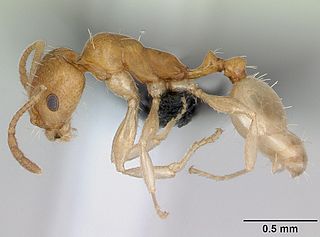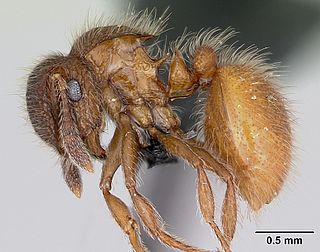
Adetomyrma is a genus of ants endemic to Madagascar. Workers of this genus are blind. The type species Adetomyrma venatrix was described in 1994, with the genus being an atypical member of its tribe, the Amblyoponini. This tribe includes the Dracula ants, members of which can feed on the hemolymph of larvae and pupae.

Mystrium is a rare genus of ants in the subfamily Amblyoponinae. First described by Roger (1862) with the description of the queen of M. mysticum, the genus contains 14 species, all of which occur in the rainforests of the Old World with over half of the species endemic to the Malagasy region.

Xymmer is a genus of ant in the subfamily Amblyoponinae containing the single species Xymmer muticus.

Euprenolepis is a Southeast Asian genus of ants in the subfamily Formicinae with eight recognized species.

Leptogenys is a genus of ants in the subfamily Ponerinae. Leptogenys is the most diverse ponerine ant genus in the world; it is widespread throughout tropical and subtropical regions and there are over 260 extant species described. Most species have ergatoid queens, and many have falcate, bowed mandibles and are specialists on isopod prey.

Adetomyrma aureocuprea is a species of ant endemic to Madagascar.

Adetomyrma cassis is a species of ant endemic to Madagascar.
Adetomyrma cilium is a species of ant endemic to Madagascar.

Stigmatomma pluto is a species of ant in the subfamily Amblyoponinae. The species was first described as Amblyopone pluto by Gotwald and Levieux in 1972 and moved to the genus Stigmatomma in 2012.

Adetomyrma bressleri is a species of ant belonging to the genus Adetomyrma. They are endemic to Madagascar.

Adetomyrma caputleae is a species of ant belonging to the genus Adetomyrma. They are endemic to Madagascar, where they are widespread.
Adetomyrma clarivida is a species of ant that belongs to the genus Adetomyrma. It is a blind species native to Madagascar. It was described by Yoshimura & Fisher in 2012.
Adetomyrma goblin is a species of ant that belongs to the genus Adetomyrma. They are native to Madagascar. The species was described in 2012 by Yoshimura & Fisher.

Vitsika is a Malagasy genus of ants in the subfamily Myrmicinae. Described in 2014, the genus contains 14 species.

Royidris is a Malagasy genus of ants in the subfamily Myrmicinae. Described in 2014, the genus contains 15 species endemic to Madagascar.
Meranoplus cryptomys is a Malagasy species of ant in the genus Meranoplus.

Meranoplus mayri is a Malagasy species of ant in the genus Meranoplus.

Meranoplus radamae is a Malagasy species of ant in the genus Meranoplus. The species diurnal.
Stigmatomma electrina is an extinct species of ant in the genus Stigmatomma. It was described in 2009 after fossils were found in the Baltic Amber.
Stigmatomma groehni is an extinct species of ant in the genus Stigmatomma. It was described by Dlussky in 2009, where it was found in the Baltic Amber, alongside another extinct species Stigmatomma electrinum.














